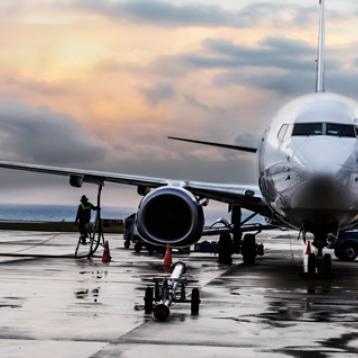- Home
- Success Stories
- Driving Towards Safe and Sustainable Transport
Driving Towards Safe and Sustainable Transport
As technology has proved a massive success in connecting people throughout the world, aided by our ever-increasing transport links, so has the increase in our travel's carbon footprint. This issue is vital in political and industrial circles. The ERPE has responded to the negative environmental and health costs of transport to make travel more efficient, sustainable and safe for people and their environment.
ERPE has been at the forefront of various transport research; some examples of these are below.
Made in Scotland: Aviation fuel of the future
Greenhouse gas emissions from the aviation industry have increased by 6%, requiring the development of novel technologies for low-carbon aviation fuels through the employment of novel processes. Reducing CO2 emissions from the transport sector is thus expected to impact the global economy and quality of life. Our work will help achieve the UK's ambitious and legislated target of reducing greenhouse gas emissions by 80 % by 2050. The technologies developed in this project (gasification of biomass and CO2 co-valorisation) are critical to meet the UK energy and environmental demands and ensure supply security.
Researchers from across the ERPE worked closely with industry in a £2m project Low Carbon Jet Fuel (LCJF) project piloting biomass fuel. The fuel made from wooden waste pellets is heated and turned into gas with other ingredients. The British Airways BA2119 Future of Fuels Challenge award-winning research has demonstrated that our process is viable over the last three years. It works and produces aviation fuel lower in CO2 emissions than current fuels.
For more information, visit the project website Low Carbon Jet Fuel.
Marine Transport
ERPE research in Naval Architecture focuses on the mitigation of marine transport's carbon footprint and racing yachts' performance improvement.
The carbon emissions of the current merchant fleet account for more than 3% of global emissions, expected to increase by a factor of 3 by 2050. There is an urgent need to develop novel flow control mechanisms to decrease the hull resistance and novel wind-assisted propulsion systems to reduce oil fuel consumption.
Offshore sailing has become one of the sports allowing the highest revenue boost to local economies. For instance, the direct and indirect financial impacts of America's Cup on the hosting region are only 20% lower than the FIFA World Cup's impact. Research on yacht engineering allows supporting the marine industry and promoting high-quality green and sport values.
Freight for your life
Demands to achieve an 80% reduction in 1990-level CO2 emissions by 2050 has left the UK road freight sector facing increasing commercial and environmental pressures. A bespoke course has sought to appease the targets by offering an eco-driving course that places individuals firmly behind the wheel of responsibility.
It is incredibly challenging because freight demand is increasing exponentially – not least from ubiquitous online retailers and the booming building industry. Following an eco-driving 'best practice' review conducted by Heriot-Watt University and Hargreaves Logistics, a course specifically focused on eco-driving has been developed. Driver training generally has the highest potential for reductions and the lowest barriers to the adoption of any sector, fuelling considerable optimism among the course creators.
The work has been disseminated among the sizeable industrial stakeholder group, leading national and international logistics companies at the Centre for Sustainable Road Freight.
As technology has proved a huge success in connecting people throughout the world, aided by our ever increasing transport links, so has the increase in the carbon footprint of our travel. This issue has been highlighted in political and industrial circles. The ERPE has responded to the negative environmental and health costs of transport to make travel more efficient, sustainable and safe for people and their environment.

Plane refuelling
Related websites
Press and Media